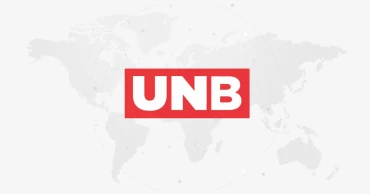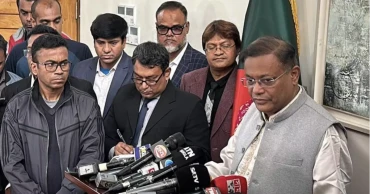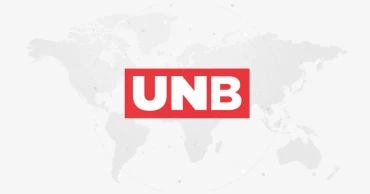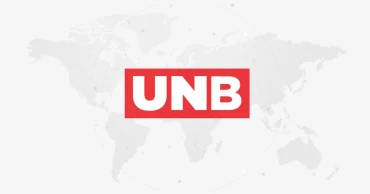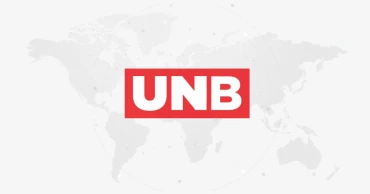foreign investment
MP Arman meets governor over potential foreign investment in Nagad
Barrister Mir Ahmad Bin Quasem Arman, a Jamaat MP, met Bangladesh Bank Governor Ahsan H. Mansur on Tuesday at his office to discuss a potential foreign investment in the mobile financial service (MFS) provider, Nagad.
The meeting was held as Bangladesh Bank sought to restructure Nagad after administrative changes and allegations of financial irregularities.
In August last year, the interim government announced plans to move Nagad from the Directorate of Posts to the private sector.
Nagad announces Royal Enfield winner in mega campaign
After the meeting, the Central Bank governor told reporters that the Postal Department lacks the capacity to run such a large operation and that a tender for new investors would be issued.
He said Nagad needs a technologically advanced partner, similar to the model used by bKash, to regain competitiveness.
Governor Mansur said the central bank will only work with credible foreign investors.
He said a letter circulating on social media did not mention any recognised investor and no official proposal has been received yet.
Arman, MP of Dhaka-14 and son of the late Mir Quasem Ali, said he is acting as a local legal representative for a group of international investors.
Nagad to receive remittances thru National Bank
He added that initial communications are ongoing and formal talks will start when the investors arrive in Bangladesh.
The names and origins of the foreign firms were not disclosed.
Launched in 2019 and later licensed as a digital bank, Nagad has faced scrutiny since the fall of the Awami League government.
A central bank audit found a deficit of over Tk 101 crore in trust settlement accounts and an e-money gap of Tk 645 crore.
In February, Bangladesh Bank filed an embezzlement case against 24 people including former Chairman Syed Mohammad Kamal and former MD Tanvir A. Mishuk.
8 days ago
Sugar industry needs local, foreign investment: Adviser Adilur
Industries Adviser Adilur Rahman Khan on Saturday (December 06, 2025) said the country’s sugar industry cannot return to profitability through subsidies alone and stressed the need for strong local and foreign investment to revive the sector.
He made the remarks while talking to reporters after visiting Natore Sugar Mill and Uttara Ganabhaban.
Adilur said the government is working to attract investments and positive developments are expected in the sugar sector either during the tenure of the incumbent government or the next one.
Read more: Closed sugar mills will be reopened: Adviser Adilur
The adviser said sugar imports remain suspended now as the government will decide on importing sugar only after the stocks preserved are sold.
Locally produced sugar is currently being marketed through the TCB, he said.
The adviser said that discussions are underway to hold a meeting of the Council of Advisers at Uttara Ganabhaban as per tradition.
Natore Deputy Commissioner Asma Shaheen, Superintendent of Police Muhammad Abdul Wahab and other officials were present.
Read more: Natore Sugar Mill workers to go on strike from Sunday
2 months ago
China's market remains a magnet for foreign investment: FM spokesperson
A foreign ministry spokesperson said on Friday that regardless of external challenges, China's manufacturing continues to be essential worldwide, and its market will always be a magnet for foreign investment, a foreign ministry spokesperson said on Friday.
It was reported that amid the severe international economic environment, China's trade and economic ties with the rest of the world remain robust. In the first five months of this year, China opened 101 international air cargo routes in total, and over 195 weekly round-trip flights were added. From January to April, China's port cargo throughput was 5.755 billion tonnes, up 3.7 percent year on year, and port container throughput exceeded 110 million TEUs, up 7.9 percent year on year.
China's railway passenger traffic surpasses 4.31 billion in 2024
In response, Lin Jian told a news briefing that in the first four months of this year, China's trade in goods grew by 2.4 percent year on year. Trade growth in April was 4.3 percentage points higher than that in the first quarter.
He said China's economy continues to unleash its vitality, and resilience in trade continues to strengthen. It fully shows that whatever challenge may appear in the external environment, China's manufacturing remains needed by the world, and the Chinese market will always be a magnet for foreign investment.
Chinese FM to attend FOCAC ministerial meeting, 4th China-Africa Expo
"Unilateralism and protectionism are unsustainable. Walls and barriers created by some will not stop China from engaging in open cooperation with other countries for shared development," he said.
8 months ago
Bangladesh opens 4-day Investment Summit amid hopes of boosting FDI
The Bangladesh Investment Summit 2025 kicked off in Dhaka on Monday marking a milestone event aimed at reinforcing the country’s commitment to economic progress, investment-friendly policies, and sustainable growth.
At the opening session of Bangladesh Startup Connect 2025, Tanveer Ali, Chairman of Constellation Asset Management Company Ltd, delivered the keynote address.
Shift towards renewable energy both urgent necessity and strategic investment opportunity: BIDA
The session featured a high-level plenary moderated by Sadia Haque, Co-Founder and CEO of Sharetrip, with panelists including Chowdhury Ashik Mahmud Bin Harun, Executive Chairman of BIDA; Faiz Ahmad Taiyeb, Special Assistant to the Chief Adviser, ICT Division; Dr. Ahsan H. Mansur, Governor of Bangladesh Bank; Dr. Md. Khairuzzaman Mozumder, Secretary of the Finance Division; and Shish Haider Chowdhury, Secretary of the ICT Division and Chairman of Startup Bangladesh Ltd.
The summit seeks to present a “genuine view” of Bangladesh to global investors by showcasing real stories of investment opportunities across various sectors, according to the Bangladesh Investment Development Authority (BIDA).
Delegations from China, the UK, the US, Singapore, South Korea, and India are among the international participants attending the summit, organisers said.
Key global figures participating include Baroness Rosie Winterton, UK Trade Envoy to Bangladesh; Jarno Syrjälä, Under-Secretary of State for International Trade at Finland’s Ministry for Foreign Affairs; Sultan Ahmed bin Sulayem, Group Chairman and CEO of DP World; Óscar García Maceiras, CEO of Inditex; Mike Orgill, Senior Director of Public Policy & Government Relations, APAC at Uber; Kyeongsu Lee, Vice President of Samsung C&T; Jon Omund Revhaug, Executive Vice President and Head of Telenor Asia; and Han Jun-seokt, CEO of Giordano Korea.
On the opening day, a delegation of investors visited the Korean Export Processing Zone. They will also visit Mirsarai Economic Zone in Chattogram.
On April 8, participants will tour the Japanese Economic Zone in Araihazar.
Tapping US energy market key to easing energy supply shortage: BIDA chief
Chief Adviser Professor Muhammad Yunus will join the summit as chief guest on April 9.
Additional highlights include a matchmaking session and a roundtable discussion on global best practices in investment.
Key partners for the event include the UNDP, FCDO, Grameenphone, the World Bank, and FICCI—underscoring the collaborative push to drive foreign direct investment (FDI) in Bangladesh.
An agreement is set to be signed with NASA during the summit, and five domestic and international investors will be honored for their contributions.
Stock Market endures worst week since 2020 as China retaliates against Trump’s Tariffs
Over 550 top-level officials from more than 40 countries, including Bangladesh, are participating in the event, converging to explore opportunities, share innovative ideas, and celebrate milestones in the country’s investment landscape.
10 months ago
Sikder Group responds to allegations following ACC case against directors
Sikder Group, a prominent business conglomerate in Bangladesh, has issued a statement in response to various media reports regarding a case filed by the Anti-Corruption Commission (ACC) against its directors, Rick Haque Sikder and Ron Haque Sikder. The group alleges that certain vested interest groups are conspiring to tarnish its reputation by disseminating misleading information.
The statement highlights that the accusations, particularly concerning alleged money laundering involving National Bank's credit card, are unfounded. It clarifies that the Sikder Group directors lawfully utilized $9.83 million abroad through credit cards, subsequently settling the total amount, including $2.04 million in interest and charges, from their foreign earnings in accordance with Bangladesh Bank regulations. This matter was resolved two years prior, and the recent resurgence of these allegations is deemed to be maliciously motivated, the statement says.
Additionally, Sikder Group explains that the credit cards in question were linked to Foreign Currency (DC) accounts, which are exempt from the standard $12,000 travel quota limit.
Eid holiday: Trade activities through Benapole port to be suspended for 5 days
The conglomerate emphasizes its longstanding commitment to ethical business practices both domestically and internationally. Sikder Group, founded by Freedom Fighter Zainul Haque Sikder, has made significant contributions to Bangladesh's development sectors, including healthcare, education, and infrastructure, the statement says.
The group suggests that the malicious targeting has intensified following the death of its founder, Zainul Haque Sikder. It asserts that under the leadership of Rick Haque Sikder and Ron Haque Sikder, it has continued to achieve remarkable progress, despite ongoing attempts by detractors to hinder its growth. The statement condemns these actions, especially at a time when Sikder Group is endeavoring to secure foreign investment for key national projects, and calls on the public to disregard the baseless accusations circulated by these conspirators.
1 year ago
‘Lobbyist-backed’ statement on Dr Yunus won’t impact FDI, Hasan Mahmud says
Foreign Minister Dr Hasan Mahmud on Thursday (January 25, 2024) said any statement “backed by lobbyists” on Nobel laureate Dr Muhammad Yunus would have no adverse impact on foreign investment inflow into the country.
“Look, there are several lobbyist firms engaged behind some people who are talking on the Dr Yunus issue. Investment will not be impacted if a statement is backed by lobbyists,” he told reporters at the Ministry of Foreign Affairs.
The Foreign Minister said Dr Yunus has been in the discussion over the last 12 years and Bangladesh still received significant foreign investment.
Read: China is an important dev and strategic partner of Bangladesh: PM Hasina
“Foreign investment is increasing. There is no relation with that. This is simply a legal matter,” said the Awami League joint general secretary.
He reiterated that Dr Yunus has been sentenced in a case filed by the aggrieved people, and the government is not a party to it.
“With due respect to Dr Yunus, I would like to say that aggrieved people filed the case. The government is not a party to it. It is a decision taken by the court. The government cannot interfere in it,” he said.
Earlier, a Dhaka court sentenced Dr Yunus and three top officials of Grameen Telecom to six months’ jail, with fine of Tk 25000 each, in a case over violation of labor law.
Read: Russian Ambassador hopes Dhaka-Moscow relations will continue to thrive
The others accused in the case are: Ashraful Hasan, CEO of Grameen Telecom Trust; trustee Nurjahan Begum; and managing director M Shahjahan.
They were accused of not making some workers and employees of Grameen Telecom permanent, not encashing public leave, and not depositing certain dividends to the Workers Welfare Foundation.
In the 84-page verdict, the judge said the charges of violating labor laws were proved against them.
The court, however, granted them conditional bail.
Dr Yunus claimed that he had been punished for a crime he did not commit. “I have been punished for a crime that I haven’t committed,” Yunus told reporters after he was convicted in a case over violation of labor law. “If you want to call it justice, you can.”
Read more: Dr Yunus appointed chair of Moscow Financial University’s international advisory board
2 years ago
Utilise export opportunities emerging due to Russia-Ukraine war: PM Hasina
Prime Minister Sheikh Hasina today (March 20, 2023) put emphasis on formulating new long term export policy for Bangladesh, considering graduation to a developing country from LDC after 2026.
“After 2026, while we will graduate to a developing country from LDC, we will get some opportunities… We have to utilise those opportunities to make our economy stronger and develop the country further,” she said.
The prime minister said this while speaking at the 11th meeting of the National Committee on Export, at her official residence Ganabhaban.
She mentioned that after graduating to a developing nation, the next aim will be to become a developed one.
Read More: Canada to increase potash exports to Bangladesh to boost food production, says country’s trade ministry
Sheikh Hasina also asked the concerned to utilise opportunities regarding enhancing Bangladesh’s export items that have emerged due to Russia-Ukraine war.
She said that due to Russia-Ukraine was, there is an opportunity for Bangladesh to create new markets with its own products.
In this regard, she said that many countries have already shown interest to import food items from Bangladesh.
“We could export food items after fulfilling local demands. We can take initiatives for that,” she said.
Read More: Simplified policy, product diversification could boost exports to UK over $12 billion by 2029: Study says
She said that immense opportunities could be created through establishing food processing industries in the country and export those items.
The PM said that the government has given importance to the export sector.
“After assuming office, we have taken steps to formulate long term export policies instead of policies on one-year basis. To sustain achievements, there is no alternative to long term strategy,” she said.
She said that the government has formulated export policy until 2024 (2021-2024).
Read More: Apparel export to EU up 14.3% during July-February of FY23
“…But what will we do after that? In the meantime, we are graduating to a developing country. I think this is the right time to consider what we will do in the coming days or how we will advance,” she said.
She put emphasis on setting the next moves for economy, keeping in mind the current economic turmoil across the globe.
“We have to find new markets across the globe. We have to diversify our products, we have to include new items in our export basket,” she said.
The PM said that the Awami League government has given utmost importance to the private sector and it opened every sector to entrepreneurs as it is not possible for the government alone to develop the country.
Read More: 'India a great potential market for Bangladesh's RMG exports'
For the development of the export sector, she said, a strategy needs to be adopted and products have to be identified.
“For that we have formulated a prospective plan – to turn the country into a developed one by 2041,” she said.
The PM also mentioned ICT and digital devices, RMG, pharmaceuticals, light and medium weight industries, motor vehicles and electronic motor vehicles, while talking about diversifying products.
She said that the government is preparing 100 economic zones with investment from home and abroad.
Read More: Bangladesh export income rises despite bad global economy
“Bangladesh has been able to attract foreign investments,” PM Hasina said.
2 years ago
Bangladesh to continue to attract increasing foreign investment despite issues: US
Bangladesh will likely continue to attract increasing investment, despite severe economic headwinds created by the global outbreak of COVID-19, says the United States.
The US sees the sustained economic growth over the past decade, a large, young, and hard-working workforce, Bangladesh's strategic location between the large South and Southeast Asian markets, and vibrant private sector as some positive things to attract investment.
Bangladesh has made gradual progress in reducing some constraints on investment, including taking steps to better ensure reliable electricity but still there are issues that hinder foreign investment, said the US government in its latest report.
The U.S. Department of State’s investment climate statement noted that inadequate infrastructure, limited financing instruments, bureaucratic delays, lax enforcement of labor laws, and corruption continue to hinder foreign investment.
Also read: US assistant secretary Sison to visit Bangladesh soon
Bangladesh’s Foreign Direct Investment (FDI) stock was $20.87 billion through the end of September 2021, with the United States being the top investing country with $4.1 billion in accumulated investments.
Bangladesh received $2.56 billion FDI in 2020, according to data from the United Nations Conference on Trade and Development (UNCTAD).
The rate of FDI inflows was only 0.77 per cent of GDP, one of the lowest rates in Asia.
The government of Bangladesh actively seeks foreign investment.
Sectors with active investments from overseas include agribusiness, garment/textiles, leather/leather goods, light manufacturing, power and energy, electronics, light engineering, information and communications technology (ICT), plastic, healthcare, medical equipment, pharmaceutical, ship building, and infrastructure.
Bangladesh offers a range of investment incentives under its industrial policy and export-oriented growth strategy with few formal distinctions between foreign and domestic private investors, says the US government.
The US government says Bangladesh's efforts to improve the business environment in recent years show promise but implementation has yet to materialize.
Slow adoption of alternative dispute resolution mechanisms and sluggish judicial processes impede the enforcement of contracts and the resolution of business disputes, according to executive summary of Bangladesh chapter.
The U.S. Department of State’s Investment Climate Statements provide information on the business climates of more than 170 economies and are prepared by economic officers stationed in embassies and posts around the world.
Also read: Hasina, Modi likely to inaugurate Maitree Power Project in Sept 1st week
They analyze a variety of economies that are or could be markets for U.S. businesses.
The Investment Climate Statements are also references for working with partner governments to create enabling business environments that are not only economically sound, but address issues of labor, human rights, responsible business conduct, and steps taken to combat corruption.
The reports cover topics including openness to investment, legal and regulatory systems, protection of real and intellectual property rights, the financial sector, state-owned enterprises, responsible business conduct, and corruption.
Buoyed by a young workforce and a growing consumer base, Bangladesh has enjoyed consistent annual GDP growth of more than six percent over the past decade, with the exception of the COVID-induced economic slowdown in 2020.
Much of this growth continues to be driven by the ready-made garment (RMG) industry, which exported $35.81 billion of apparel products in fiscal year (FY) 2021, second only to China, and continued remittance inflows, reaching a record $24.77 billion in FY 2021.
As a traditionally moderate, secular, peaceful, and stable country, Bangladesh experienced a decrease in terrorist activity in recent years, accompanied by an increase in terrorism-related investigations and arrests following the Holey Artisan Bakery terrorist attack in 2016, says the US report.
Rohingya Issue:
Bangladesh continues to host one of the world’s largest refugee populations.
According to UN High Commission for Refugees, more than 923,000 Rohingya from Burma were in Bangladesh as of February 2022.
This humanitarian crisis will likely require notable financial and political support until a return to Myanmar in a voluntary and sustainable manner is possible, says the US government.
Workers’ Rights:
International retail brands selling Bangladesh-made products and the international community continue to press the government of Bangladesh to meaningfully address worker rights and factory safety problems in Bangladesh, says the US government.
With unprecedented support from the international community and the private sector, the Bangladesh garment sector has made significant progress on fire and structural safety, it said.
Critical work remains on safeguarding workers’ rights to freely associate and bargain collectively, including in Export Processing Zones (EPZs), according to the US government.
The Bangladeshi government has limited resources devoted to intellectual property rights (IPR) protection and counterfeit goods are readily available in Bangladesh. Government policies in the ICT sector are still under development.
Current policies grant the government broad powers to intervene in that sector.
Capital markets in Bangladesh are still developing, and the financial sector is still highly dependent on banks.
3 years ago
B’desh gets $750 mln foreign investment in startup in a decade: Palak
The country has received foreign investment of over $750 million in the startup sector in a decade, said State Minister for Information and Communication Technology Zunaid Ahmed Palak on Wednesday.
He said this at the BCC auditorium of ICT Tower in Dhaka while participating in the second phase of Investment Assistance for Startups under the "Shotoborshe Shoto Alo" campaign organized by ICT Department’s Startup Bangladesh Limited.
Read: Inter-operable Digital Transaction to begin from January: Palak
He said the government is providing financial assistance to the country’s nearly 22,500 startups through Bangabandhu Innovation Grand (Big), the idea project of Startup Bangladesh Limited.
Palak said "Shotoborshe Shoto Alo", an initiative by the department to commemorate the birth centenary of Father of the Nation Bangabandhu Sheikh Mujibur Rahman and the golden jubilee of Bangladesh, aims to invest Tk 100 crore in 50 startups and create entrepreneurial culture and employment in the country.
As part of this, an investment agreement was signed today to provide capital assistance of Tk 17 crore to eight startups in the second phase.
As an investor, Sami Ahmed, managing director of Startup Bangladesh Ltd. and CEOs of the eight companies signed the agreement on behalf of their respective organizations. The eight startups are- Hello Task, 10 Minutes School, iFarmer, Frontier Nutrition, Loop, Zantrik, Shuttle and Truck Lagbe.
In the first phase, seven startups were given Tk 17 crore.
Palak said the initiative would create a national entrepreneurial platform in the country and accelerate the implementation of new innovations.
Read:Remotest region to connect with broadband internet by 2025: Palak
Specialized labs in 53 universities, Fourth Industrial Revolution Centers, Joy Digital Service Centers in 494 upazilas, 300 Schools of Future, Sheikh Hasina Institute of Frontier Technology are being set up to cope with the Fourth Industrial Revolution, he added.
Executive Director of Bangladesh Computer Council Dr Md Abdul Mannan, Ambassador of Turkey to Bangladesh Mustafa Osman Turan and President of Bangladesh Association of Call Centers and Outsourcing Wahid Sharif spoke at the event among others.
3 years ago
Bangladesh wants Qatar to invest in SEZs
Bangladesh has invited Qatar to benefit from Bangladesh’s growth by investing in its Special Economic Zones.
Bangladesh also thanked the Qatari government for providing free Covid-19 vaccines to Bangladeshi expatriate workers in Qatar.
Read: Biman to run special flights to 5 countries from Apr 17
Outgoing Ambassador of the State of Qatar to Bangladesh Ahmed Bin Mohamed Nasser Al Dehaimi met State Minister for Foreign Affairs Md Shahriar Alam in his office on Tuesday and discussed these and other issues of mutual interest.
Shahriar underlined that the bilateral ties between the two countries have reached new heights as envisaged by Prime Minister Sheikh Hasina and the Emir of Qatar in areas, including energy and power, business, trade and investment.
The State Minister congratulated the Ambassador on the successful completion of his tour of duty in Bangladesh and appreciated him for his efforts to boost the bilateral ties between Bangladesh and Qatar during his tenure.
Read:Dhaka for enhanced trade ties with Doha
The outgoing envoy praised the socioeconomic development of Bangladesh and conveyed the Qatar government’s eagerness to work more closely with Bangladesh in areas of mutual interests.
He thanked the State Minister for extending his support to him while performing his duties.
4 years ago




